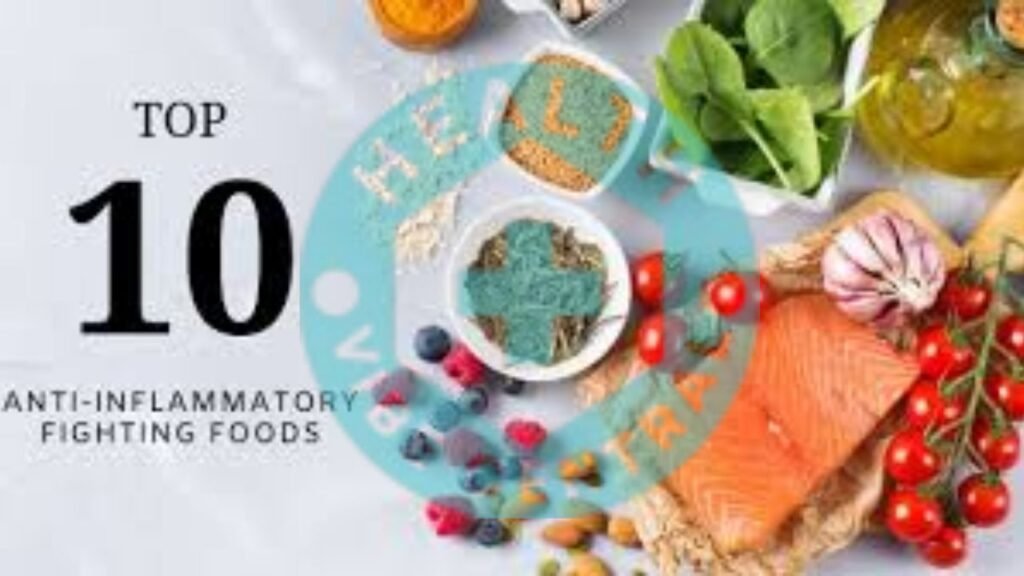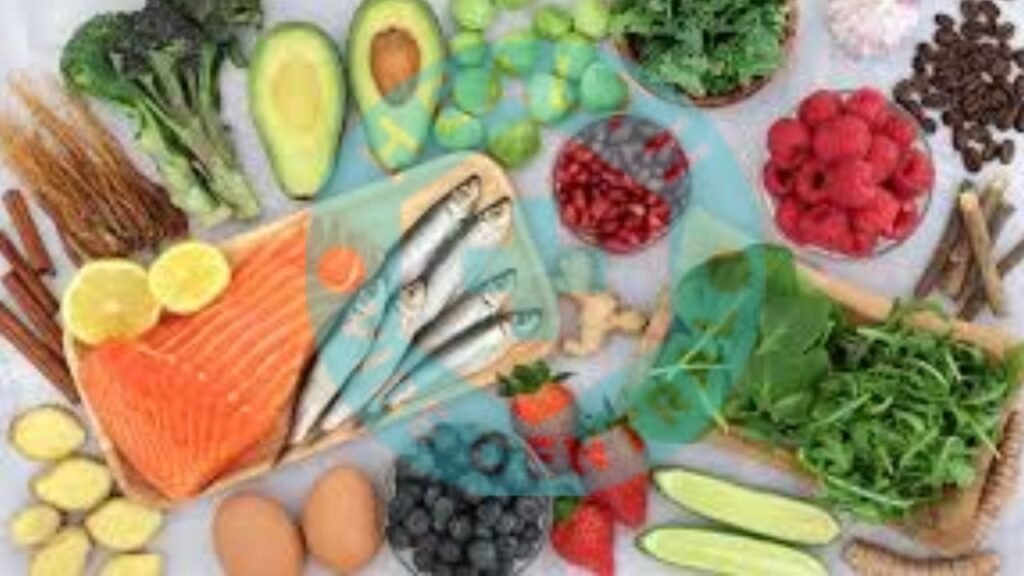Introduction

Inflammation plays an important role in your body to heal itself as well as protecting itself against any harm. However, inflammation becomes unhealthy when it is persistent and triggers Anti-Inflammatory Foods other problems like heart disease, diabetes, arthritis and so on. Here’s the good news:
There is much you can do to change the that what you eat has on inflammation levels within your body. The food nutrients that fight inflammation are known and including these foods in your meal plan can lead to improved health.
In this article, we are going to look at 10 anti-inflammatory foods which have lots of benefits and how they can help to fight inflammation within the body. Now let’s take a look at a number of foods and how they can assist with improving the quality of your life.
1. Understanding Inflammation
There are anti-inflammatory foods, and there are foods that promote inflammation within the body. Anti-inflammatory foods include ingredients with particular chemicals that are Anti-Inflammatory Foods scientifically known to reduce inflammation in different body tissues and eliminate diseases.
anti-inflammatory foods include antioxidants, vitamins and good fats. The diastrophic nutrients have the synergistic effect of combating free radicals – these unstable elements Anti-Inflammatory Foods that result into oxidation and inflammation.
Common signs of chronic inflammation include:
- Joint pain or stiffness
- Fatigue
- Digestive issues
- Weight gain
The foods we consume can either contribute to inflammation or help reduce it. Anti-inflammatory foods contain specific compounds that have been proven to lower inflammation in the body, protecting against disease and improving overall well-being.
2. The Science Behind Anti-Inflammatory Foods
Anti-inflammatory foods are rich in antioxidants, vitamins, and healthy fats. These nutrients work together to neutralize free radicals—unstable molecules that can cause Anti-Inflammatory Foods oxidative stress and lead to inflammation.
Key compounds in anti-inflammatory foods include:
- Antioxidants: Commonly found in fruits and vegetables, antioxidants serve to keep the cellular damage by free radicals in check.
- Polyphenols: Essential substances derived from plant sources like berries and green tea that tend to decrease inflammation.
- Omega-3 Fatty Acids: Intakes of such fats present in fatty fish have been observed to reduce concentration of inflammatory factors.
- Research indicates that avoidance of inflammatory foods may reduce the incidence of chronic disorders and boost the body’s defense mechanisms besides improving mental state.
3. Top 10 Anti-Inflammatory Foods
Here are the top 10 anti-inflammatory foods that can help reduce inflammation and promote better health:
1. Turmeric (Curcumin)
Curcumin, a rich antioxidant present in the bright yellow spice called turmeric powder which is used in preparing Indian dishes. Inflammation has been one the area which curcumin has been most associated with in terms of suppression due to its ability to inhibit specific signaling cascades responsibl Anti-Inflammatory Foods e for inflammation within the body.
- Nutritional Profile: Have high antioxidant and bioactive value.
- How It Reduces Inflammation: Curcumin suppresses molecules such as NF-kB which are known to provoke inflammation.
- How to Consume: Include turmeric in your diets by using it in preparations such as soups or curries, taking it as tea or even having it with milk at night.
2. Berries (Blueberries, Strawberries, etc.)
Berries contain vitamins and minerals together with antioxidants known as Anthocyanin, which are anti-inflammatory. Scientific research has demonstrated that anti-inflammatory metabolic markers and the threat of chronic diseases can be lowered by taking berries on a regular basis.
- Nutritional Profile: They are rich in vitamin C and K, fiber and antioxidants.
- How They Reduce Inflammation: They want anthocyanin which has antioxidants and anti inflammatory properties in increasing the body oxidative stress and inflammation.
- How to Consume: Drinking them in smoothie Anti-Inflammatory Foods s, adding it to yogurt, topping oatmeal, or having it as a snack is also okay.
3. Leafy Greens (Spinach, Kale, etc.)
Greens are dietary treasures that are packed with vitamins, minerals and anti-inflammatory antioxidants. The vegetables contain high amount of vitamin E, a nutrient that helps the body counteract the effects of bad molecules, especially those that produce inflammation.
- Nutritional Profile: Rich source of vitamin A, C and K, and contain fiber and antioxidants.
- How They Reduce Inflammation: Most of the green leafy foods are also powerful sources of carotenoids that enhance the detoxification process due to oxidation.
- How to Consume: It can be in salads, green Anti-Inflammatory Foods smoothies or in stir fry
4. Fatty Fish (Salmon, Mackerel, Sardines)
Salmon, mackerel and sardines are rich in omega-3 fatty acids that has strong anti–inflammatory components. Omega-3s are beneficial in the sense that they lower the formation of pro-inflammatory cytokines and encourage anti-inflammatory functionality in the body.
- Nutritional Profile: Rich in protein, omega three fatty acid and vitamin D.
- How They Reduce Inflammation: Omega-3s Anti-Inflammatory Foods counteract the release of eicosanoids and cytokines which are potent inducers of inflammation.
- How to Consume: Fatty fish is best barbecued, broiled, baked or even fried or in sushi or salad.
5. Nuts (Walnuts, Almonds)
Nuts like walnuts and almonds contain good fat, fiber besides protein and are considered helpful for health. These seeds are rich in alpha-linolenic acid (ALA), an omega-three fatty acid that assist to decrease inflammation.
- Nutritional Profile: contains high fiber, healthy fats, and antioxidants.
- How They Reduce Inflammation: Specifically, in walnuts, ALA reduces the levels of inflammatory biomarkers.
- How to Consume: Can be consumed as a snack, included in salads, oatmeal or smoothies.
6. Olive Oil (Extra Virgin)

EVOO is an important component of the Mediterranean diet, which has been noted for its positive cardiovascular impact and, in general, it is an anti-inflammatory type of oil. It has oleocanthal, which has action like Non steroidal anti Inflammatory drugs- NSAIDs.
- Nutritional Profile: A source of monounsaturated fats, and polyphenols.
- How It Reduces Inflammation: Oleocanthal reduces the actions of certain inflammatory enzymes.
- How to Consume: Serve it over salads, mix with other dishes or as salad dressing.
7. Tomatoes
Potent antioxidant and anti-inflammatory compound called Anti-Inflammatory Foods lycopene is present in great amounts in tomatoes. It has been established that the compound lycopene possesses anti-inflammatory properties mainly in the lungs and also the gastrointestinal tract.
- Nutritional Profile: Source of vitamins C and K, and lycopene.
- How They Reduce Inflammation: Lycopene prevents free radicals and reduces the level of inflammation.
- How to Consume: You may eat them raw, roasted, put them in sauces.
8. Garlic
Eating garlic also has been shown by Allicin, a sulfur based compound in garlic, to help to decrease inflammatory markers in the body. They also enhance the immune system nearness and they also prevent diseases related to chronic inflammation.
- Nutritional Profile: It is also a source of Vitamin C, B6, and manganese.
- How It Reduces Inflammation: Allicin ….reduces the production of specific proteins called cytokines that promote inflammation.
- How to Consume: Garlic can be used raw in all the foods you fry, in sauces, dips, or it can be roasted and used on vegetables.
9. Ginger
For many years, ginger has been considered to have health benefits with the Anti-Inflammatory Foods ability to reduce inflammation most markedly. The present compound found in ginger known as gingerols possess strong anti-inflammatory and antioxidant properties.
- Nutritional Profile: Contains a considerable amount of gingerols and antioxidants.
- How It Reduces Inflammation: Gingerol plays the role of anti-inflammatory enzyme, and decreases effects from oxidative stress.
- How to Consume: Applying ginger tea or using it in Anti-Inflammatory Foods meals and adding ginger to fruit smoothies.
10. Green Tea
Green tea contains large amounts of polyphenol, especially EGCG which possess potent anti-inflammatory properties. Green tea has been recommended as it can prevent high inflammations and consequently cut short cases of chronic diseases.
- Nutritional Profile: Packed with antioxidants – particularly catechins including EGCG.
- How It Reduces Inflammation: EGCG has an affect on inhibition of inflammatory processes.
- How to Consume: You can have it daily as tea or incorporate matcha powder in your smoothies.
4. How to Build an Anti-Inflammatory Diet
Taking care of the anti-inflammatory diet doesn’t have to be Anti-Inflammatory Foods rocket science. Above are the foods that should be included in your daily meals, so try and start with them. Choose foods with little processing and as much as possible avoid white sugar, refined carbohydrates and unhealthy fats.
Tips for Building an Anti-Inflammatory Diet:
- Include a variety of colorful fruits and vegetables.
- Choose healthy fats, such as those found in olive oil and nuts.
- Prioritize omega-3-rich foods like fatty fish.
- Limit processed and sugary foods.
- Stay hydrated with water, herbal teas, and anti-inflammatory beverages like green tea.
Meal prepping and planning can also make it easier to maintain a balanced, anti-inflammatory diet throughout the week.
5. The Role of Hydration in Fighting Inflammation
Water is a key component when it comes to human health Anti-Inflammatory Foods and is especially important in order to regulate inflammation. As a natural cleanser, water rids the body of toxins that cause inflammation, and also supports the functions of your body’s organs. Besides, water good inflammation fighting beverages are herbal teas such as ginger and green teas.
6. Lifestyle Changes to Support an Anti-Inflammatory Diet
There also are actions that promote the decrease of inflammation aside from changing the types of food to be eaten. In fact, regular workout sessions, stress control, and good sleep are some of the ways which can help ensure that inflammation levels remain low.
- Exercise: The prevention of inflammation is also another benefit Anti-Inflammatory Foods of repetitive involvement in physical exercise.
- Stress Management: Use of drugs When one is stressed for very long he/she becomes prone to inflammation therefore adopting methods such as meditation, practicing yoga and deep breathing.
6. Lifestyle Changes to Support an Anti-Inflammatory Diet (continued)
Sleep: Lack of adequate sleep or sleep at night can Anti-Inflammatory Foods lead to production of inflammatory products in the body. Adults should get quality sleep of 7-9 hours per day in order to allow the body to repair and reduce inflammation.
Key Lifestyle Tips to Support Anti-Inflammatory Diet:
Exercise: Diet: Consume foods with lots of fiber, less saturated fat, salt and sugar and make sure to take at least 5 relatively moderate exercise sessions weekly as in walking, swimming or cycling for not less than 30 minutes per session.
Stress Management: Stress can be managed through mindfulness, meditation, or
breathing exercises such as the following:.
Sleep: Sleep at regular hours, sleep well and develop a habit of correct going to bed.
If you then add these lifestyle habits to an anti-inflammatory diet, it proven to be a complete and effective solution nurturing out bodies against inflammation..
7. Conclusion
- Inflammation affects many diseases, and, on the other Anti-Inflammatory Foods hand, the best way to fight it is to adhere to an anti-inflammatory diet
- . An anti-inflammatory diet is filled with foods that can reduce inflammation and strengthen the body’s immunity such as, turmeric, berries, leafy vegetables, fatty fish, and nuts.
- Introducing these anti-inflammatory foods in the meals, proper hydration and adoption of the constructive lifestyle measures including exercise, stress reduction, and sleep: can successively affect the quality of life.
- It is possible to significantly avoid inflammation and improve your quality of life in the long-term simply by adopting a different way of life and focusing on your diet.
Meta Discription
“Discover the top 10 anti-inflammatory foods that reduce chronic inflammation naturally. Learn how these powerful foods can improve your health and how to easily Anti-Inflammatory Foods incorporate them into your diet.”
1 thought on “Top 10 Anti-Inflammatory Foods: Powerful Solutions for Reducing Inflammation Naturally”